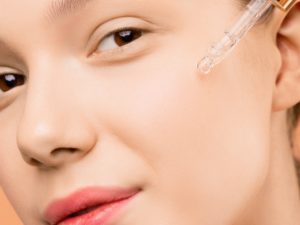Collagen in Skincare – Amazing Game Changer or Waste of Money
Collagen in skin care is becoming more and more popular by the day. Are there any benefits to collagen in skin care or is it just a waste of money? Let’s find out.

Learn everything you need to know about collagen and skin care including whether or not it works. Learn about the importance of collagen in the body and what you can do to support its production.
What is Collagen
Collagen is the most abundant protein in the body. It makes up the structural support for cells, muscles, and joints. There are four types of collagen, with type 1 being the most common making up over 90% of the collagen in the body.
Purpose in the Body
Collagen is a building block for many body structures including the muscles, joints, tendons, ligaments, skin, and bones. Collagen is also found in blood vessels, teeth, and in the corneas of the eyes.
While type 1 is the most common type of collagen, the other types are also important. Type 2 helps cushion joints, type 3 supports blood vessels and muscles, and type 4 is found in the skin.
Importance of Collagen
Collagen is very important for joint, muscle, and ligament health. It allows us to move properly throughout life and provides support for many biological processes. As we age our body will naturally start to produce less collagen and any collagen it does produce may be lower quality.
Signs that you can look out for for collagen loss include stiffness in the joints or tendons. You may notice that your skin bruises with more ease. Skin texture may become less firm with more fine lines and wrinkles due to a decrease in elasticity and collagen.
This is the reason why many products try to include collagen. They aim to replace collagen loss in the skin with the collagen in their products, but does this actually work?
Collagen in Skincare
So, what’s the verdict for collagen in skin care? While nice in theory, collagen, and skincare does not have the intended effect of increasing or supporting collagen production. Collagen molecules found in skin care are too big and cannot easily penetrate the skin. Collagen produced in the skin is on a much deeper layer. Any collagen found in skin care does not reach this deep layer for your body to use.
Benefits
The sky is not just cloudy, there is a silver lining. Collagen is a humectant. This means it has moisturizing and hydrating properties, allowing it to draw in moisture. This can help temporarily reduce the appearance of fine lines and wrinkles while leaving the skin softer and smoother.
It is important for the skin barrier to be supported. This is because the skin is our largest organ and is responsible for many things such as protecting us, immune defense, temperature regulation, etc. One of the best ways to support the skin is for our skincare to be hydrating and moisturizing. A healthy skin barrier will accomplish its job and will have the added benefit of looking nice. For more information about the skin barrier and how to create a skincare routine that works for you, check out this article here.
Other Sources of Collagen
Here are some ways that you can increase your body’s natural production of collagen. This includes things you can eat, supplements, or even other skincare ingredients that actually do have research behind them stating that they increase collagen production.
Supplements
If you want actual changes in your skin texture and elasticity, the best way to go about it is through the consumption of collagen, not applying it in skincare. Collagen supplements are very effective. This includes pills or powders that you can add as a bonus to your daily nutrition. Many powders can be added to smoothies, soups, yogurt bowls, etc. This makes it a great and versatile option.
One of the best forms of collagen supplements is hydrolyzed collagen as this form is easy to absorb by the body. Check out this article here for everything you need to know about collagen supplements and how they can benefit overall health and wellness.
Food
It is also important for us to be consuming natural ingredients that can help the body produce its own collagen. This includes vitamin C so eating citrus, blueberries, strawberries, and bell peppers is super important. Zinc is required for collagen production, so make sure you’re eating some cashews, leafy greens, mushrooms, and legumes. Small trace amounts of copper are vital, this can be found in mushrooms and leafy greens. Additionally, you need some amino acids such as proline and glycine which can be found in eggs, seafood, chicken, bone broth, and gelatin.
Skincare
Some skincare ingredients will increase collagen production. This includes retinoids and vitamin C. Retinoids are a form of vitamin A that increases skin turnover and have been highly studied. These have been effective in increasing skin elasticity and collagen production. Vitamin C is another highly studied skincare ingredient. It is an antioxidant and can penetrate deeply into the skin to also increase collagen, which can lead to a more plump and firm appearance. For a full list of ways that you can stimulate collagen production, check out this article here.
The Takeaway
Collagen in skincare sounded like an amazing and resounding success. However, reality’s a bit more, well, realistic. Collagen and skin care will not increase collagen production. Collagen molecules are too big and will not penetrate the deep layer of the skin in which collagen is produced. You can expect some moisturizing and plumping effect while you use a product with collagen though, which can be very beneficial for the skin barrier. Aside from that, there are real ways that you can increase collagen production such as consuming it or using other skincare ingredients such as retinoids.
Remember that health comes from within. Eat nutritious food, exercise when you can, and take care of your mental health. The small daily habits you cultivate become the basis for overall wellness. Don’t forget about microbiota health too! Gut microbiota affects the entire body, from the skin to muscles, to immune and mental health! Get all the resources you need about microbiota health for free here!





